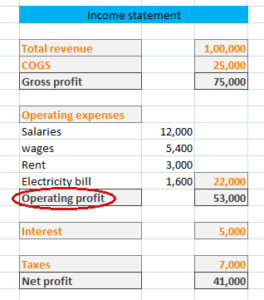Table of Contents
Operating profit is the excess of net revenue over COGS and operating expenses of a company. Operating expenses include selling, general and administrative expenses. These expenses are not directly associated in production of goods or services.
It refers to that amount of profit which is remained after deducting both direct and indirect expenses however, accounts for interest and taxes. For this reason, it is also known as EBIT (Earnings before interest and tax).
Formula for the calculation of operating Profit:
EBIT is the difference between gross profit and operating expenses of a company. Therefore, the formulas which can be used in calculation are:
Net revenue – (COGS + Operating expenses)
Or
Gross profit – Operating expenses
Cost of goods sold (COGS) = Opening stock + Purchases – Closing stock
Example:
From the figures given in income statement of XYZ ltd, EBIT can calculated as:

Gross profit = 75,000
Operating expenses = 22,000
Operating profit = 75,000 – 22,000 = 53,000
This figure is used in the calculation of net profit and operating profit margin.

Very informative article.
Good..
Well done, it will help